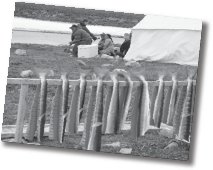- Hint for the facilitator! The excitement and emotion of a discussion causes
people to forget about their inhibitions and to try to use a language in which
they are not perfectly comfortable. Take opportunities to hold discussions in
Inuktitut, Inuinnaqtun or whichever language the group wants to develop. As
facilitator, you should not correct people while they are speaking; let them
speak freely to express their ideas – even if they are not speaking correctly.
Help them only if others don’t understand what they are trying to say. But
make a note of vocabulary and grammar mistakes that come up during
discussions and teach these points as mini-lessons later.
- Idea! Encourage group members to keep vocabulary lists of unfamiliar
words that come up during discussions. You can use them later in personal
dictionaries or mini-lessons on vocabulary or spelling.
Resources
Dominion Institute’s Great Canadian Questions Online – www.greatquestions.com
Creative Controversy: Intellectual Challenge in the Classroom by David Johnson and
Roger T. Johnson. Interaction Book Company, 1995. ISBN:0939603233
How to Construct an Argument, “A Writing Centre Handout”, from Wilfred Laurier
University Writing Centre. www.wlu.ca/writing/handouts/argument.htm
The Basic Principles of Persuasive Writing, from University of British Columbia
WritingCentre’s Writers’ Workshop. www.writingcentre.ubc.ca/workshop/tools/argument.htm

